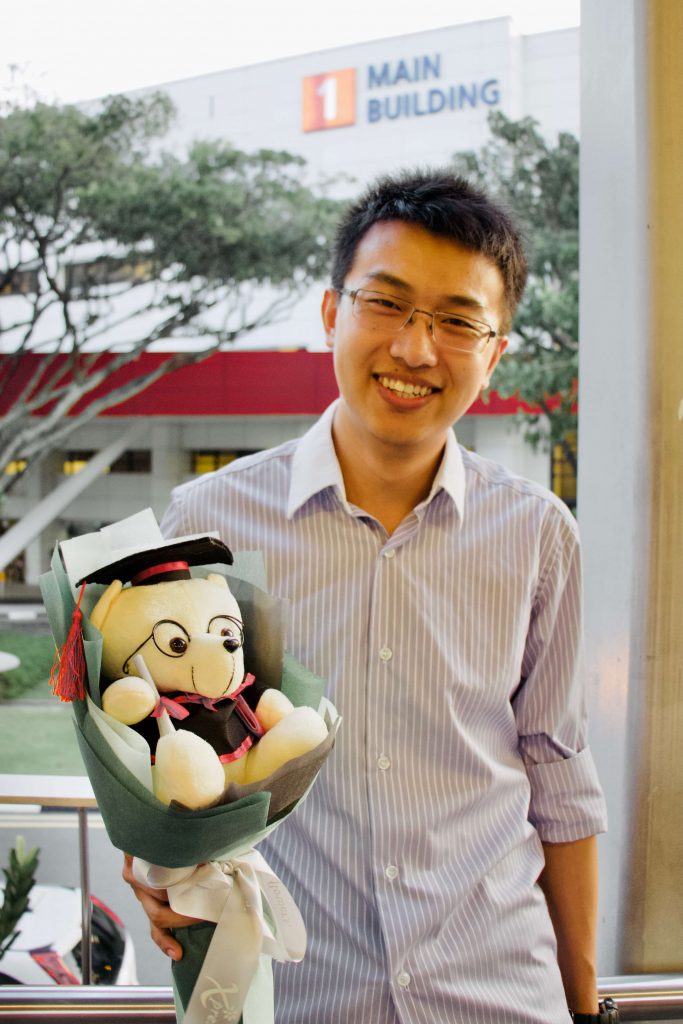Our Alumnus Speaks…
Department of Physics catches up with alumnus Mr Wang Boyu (MSc, 2015), currently a senior Data Scientist based in Singapore.
How do you think your physics education at the department has played a role in advancing your career growth?
It most certainly played a paramount role in advancing my career growth, particularly in the knowledge I gained from learning applied mathematics. Specifically, to keep up with the state-of-the-art in the field of data science, I needed to do literature reviews and read up technical books. Thanks to my physics background, I can easily follow and understand the complex yet important formula derivations in the methodology sections.
My physics education also has a profound impact on my general mindset as it trained me with keen perception towards collecting noisy and chaotic observations from the real world and uncovering insights from them through mathematical models. Working as a data scientist requires me to be sensitive to the hidden data and good at validating and testing different models, which is similar to why and how physicists conduct experiments to test out theories propounded from past observations.
Share with us more about the data industry, in particular what attributes will be important to land a career as a data scientist.
Unlike conventional works with fairly well-defined prerequisites and requirements, data science is an emerging field that requires a relatively broader range of skill sets. There are also various types of data scientists in the job markets, where the responsibilities and expected technical skills are diverse depending on the specific industries. For example, data scientists who focus more on the descriptive or analytical side would need to know more about experimental design, visualisation, communication, etc, while those who work on building predictive models (like myself) would be expected to be more familiar with machine learning, model deployment, monitoring, and so on.
In my opinion, people with strong foundations in computer science (programming, algorithms and data structures), math (linear algebra and calculus) & statistics and some business sense are more likely to be favoured by current industries. In addition, having a curiosity and passion for new emerging techniques, tools and methods is important as we can keep improving ourselves through lifelong learning. Last but not least, having some hands-on experience on data science projects is essential. For students and fresh graduates, these could be coursework projects from the university or online courses.
I highly recommend reading the book “The Data Science Handbook: Advice and Insights from 25 Amazing Data Scientists”, which includes interviews of data scientists working at different organizations. You may get to know more about their day-to-day work and hear more career advice from them.
What are some present challenges and also opportunities in the marketplace?
I understand the pandemic has brought challenges to a lot of us in finding a suitable place to work, but it has also become more difficult for employers to find proper hires. Promising candidates with the desired level of work experience and expertise may receive several offers, and there is stiff competition in terms of hiring. But there are always opportunities out there in the marketplace for qualified professionals.
While it can be unrealistic to expect fresh graduates to have relevant work experience, there are still certain things that they can do to fill the gap. One example is internship. An internship can be a valuable opportunity for full-time students to gain hands-on experience in real-world projects. It is also a good way for students to have an initial sense of what a full-time role looks like by observing the routine work of co-workers and ask themselves if this is the work they have wanted.
If time could reverse and if you have a chance to start all over again to pursue a field of study, what would it be and why?
I will most likely pursue physics again because it has always been my favourite subject. Even today, I would love to have a chance to return to the lecture theatres and attend some physics lectures. But there are a few adjustments that I would like to make to my curriculum if time could reverse. I would enrol in more computer science and statistics modules, which are also subjects I am interested in. To make up for this regret, I have to attend many online courses to teach myself after graduation.
What words of encouragement or advice would you like to share with our students?
I believe students from NUS are young and promising talents with adequate knowledge and skills. Despite the challenges during this difficult time, there are still opportunities for them to follow their passion. One piece of advice that I would like to share is not to accept a job offer just for the sake of being offered, but instead focus on what motivates you and insist on pursuing it.

In addition, having a curiosity and passion for new emerging techniques, tools and methods is important as we can keep improving ourselves through lifelong learning.
Mr Wang Boyu
